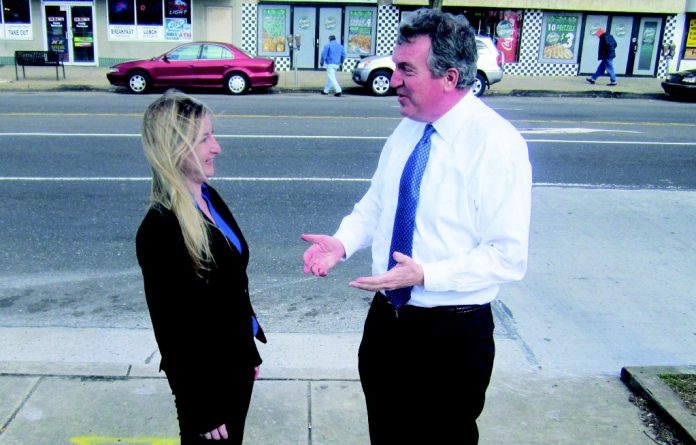Dealing with the aftermath: AmeriHealth Mercy’s Katie Hopkins, with assistance from colleague Chris Drumm, organized last Friday’s public symposium, ‘Superstorm Sandy: The Emotional Aftermath,’ at Richard Stockton College in Galloway, N.J. TOM WARING / T
When Superstorm Sandy landed in late October and greatly damaged the New Jersey coastline, Katie Hopkins wanted to do something to help.
Hopkins, a Cardinal Dougherty High School graduate and Rockledge resident, is a manager of government relations for AmeriHealth Mercy, a healthcare company whose primary focus is Medicaid-managed care.
“What can we do? What are our tools?” Hopkins said she asked herself.
After conferring with colleagues, she settled on planning a public event titled Superstorm Sandy: The Emotional Aftermath.
The forum, which drew about 250 people to Richard Stockton College last Friday, brought together a panel of professionals and a keynote speech by Patrick Kennedy, a former congressman from Rhode Island and son of the late U.S. Sen. Ted Kennedy.
Patrick Kennedy, 45, served in Congress from 1995 to 2010. After leaving the House of Representatives, he married a teacher. He and his wife live in Brigantine, N.J., with their son, Owen. Kennedy said his “heart is here in New Jersey.”
In Congress, Kennedy — who is bipolar and has battled alcohol issues — helped shape a law that requires group health plans to fund care for mental illness at the same level as physical illnesses. Kennedy brought up that theme when discussing what the victims of Sandy are going through in the storm’s aftermath.
“This isn’t about mental health, psychological health or psychiatric health,” Kennedy said. “Let there be no mistake what this is about today: physical health.”
At another point in the discussion he said people needed to “start dealing with checkups from the neck up.”
Alongside Kennedy on the panel were Zack Rosenburg, chief executive officer and co-founder of the St. Bernard Project; Jeffrey Guenzel, deputy commissioner of programs and services at the New Jersey Department of Children and Families; Debra Wentz, chief executive officer for the New Jersey Association of Mental Health and Addiction Agencies Inc.; Marlene Lao-Collins, executive director at the Catholic Charities, Diocese of Trenton; and Adrienne Fessler-Belli, director, Disaster and Terrorism Branch, Division of Mental Health and Addiction Services, New Jersey Department of Human Services.
Rosenburg and Fessler-Belli talked about their experiences dealing with previous disasters. Rosenburg and the St. Bernard Project lent a hand during Hurricane Katrina, while Fessler-Belli dealt with victims after 9/11.
Rosenburg pointed out that during the aftermath of Hurricane Katrina, the St. Bernard Project workers helped rebuild houses, but they could not recreate homes.
“Folks inserted hope into the vessel of their house being restored,” Rosenburg said. “Once it was complete, though, people realized that things weren’t going to be the same.”
The panel, guided by well-known New Jersey broadcaster Steve Adubato, expanded on that note as members discussed how the victims of Sandy are reaching the six-month point. Wentz said residents experience anxiety and trauma when things still aren’t back to normal.
Rosenburg responded to that by saying that a path has to be clear, prompt and predictable to keep victims calm through the process.
The rest of the forum allowed each panel member to share their thoughts about the disaster and the aftermath before they answered questions from the audience.
The forum was sponsored by PerformCare New Jersey, an affiliate of AmeriHealth Mercy, along with AtlanticCare, Catholic Charities, the New Jersey Association of Mental Health and Addition Agencies and Richard Stockton College.
In planning the event, Hopkins said it would help help people who “will have to deal with the aftermath of the storm days, weeks, months and years down the line.”
An Olney native and La Salle University graduate, Hopkins credits her parents with instilling in her the values to help others.
At Dougherty, she spent a week building homes in a poor area of West Virginia and participated in the Best Buddies partnership with the special-needs students at Our Lady of Confidence.
She’s also volunteered for the Fox Chase Champions, which offers a sports program for young people with special needs. In May, she plans to travel to New Orleans to build homes with the St. Bernard Project with Rosenburg.
Hopkins hopes that AmeriHealth and other agencies can assist people experiencing stress and trauma to be able to get the resources they need during the ongoing recovery.
“We can help,” Hopkins said. “It is very rewarding. It’s not every day you can reach out, build networks and help change someone’s life.”
The mission of AmeriHealth Mercy, which is based in Delaware County just across the border from Southwest Philadelphia, is to help people get care, stay well and build healthy communities. ••





